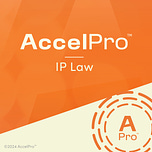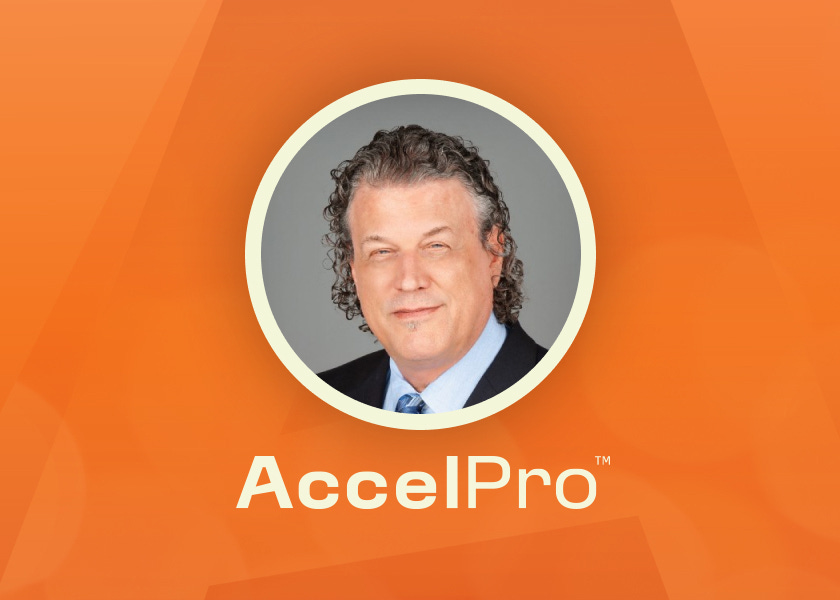Listen on Apple Podcasts, Spotify and YouTube.
Welcome to AccelPro IP Law, where we provide expert interviews and coaching to accelerate your professional development. Today we’re featuring a conversation with David Cain, patent attorney at Hauptman Ham.
Cain is a patent attorney with 39 years of experience in the global IP landscape, specializing in patent preparation, prosecution and portfolio management. He focuses on artificial intelligence, medical devices, robotics, agriculture, cryptography and communication technology.
We talk about strategic patent planning, working with startups, IP strategy for investors and more.
“The clients we're talking to usually have a patent strategy and a budget. The problem I see is that, often, that strategy doesn't evolve with the company. As companies go through different phases, they may need different strategies. If they haven't left their options open, they may be confined to that initial strategy and never revisit it.”
Listen on Apple Podcasts, Spotify and YouTube.
Interview References:
David Cain’s Hauptman Ham profile.
7:47 | Cain, David. Strategic Patenting: Balancing Innovation and Intellectual Property. (10 January, 2024). LinkedIn.
TRANSCRIPT
Neal Ungerleider, Host: How do you define strategic patenting and why is it important for startups?
David Cain: Strategic patenting, in my mind, keeps in focus the fact that you start with an intellectual property strategy. The clients we're talking to usually have a patent strategy and a budget. The problem I see is that, often, that strategy doesn't evolve with the company. As companies go through different phases, they may need different strategies. If they haven't left their options open, they may be confined to that initial strategy and never revisit it.
The way I've phrased “strategic patenting” in my mind is that every decision maker in a tech company has to answer questions. Some of them are big questions that you only revisit occasionally. Some are constant questions that you may have to revisit once a week. Those questions themselves require answers to other questions.
Put these questions in front of decision makers in ways that they can answer. Rather than just saying what kind of patent portfolio you need, break that down into, what we are trying to accomplish, what our resources are, and where we go from there. That is strategic patenting to me. It's putting your resources to best use in the long run of patenting.
I'm afraid there's a short term focus with these questions because it's such an expensive endeavor that people get an idea of what they want to do, and then they're afraid to revisit it. You have to constantly look at your IP as an open question.
NU: How do you identify and prioritize potential IP assets within a startup?
DC: That's a tough question that's often brushed aside, especially because startups tend to be very focused. They've got an idea that they want to sell and they've got to sell it to their investors. They're always trying to say “Here's what our product will be, and we need to protect that.”
They ask their engineers “What have you done that's new?” The engineers say, “We're doing this.” The problem with that is that the IP questions are very big in scope. You may have invented something important for this field, but the principles may be in a completely different field.
While you may have no interest in going after licensing, there are a lot of scenarios where that could be useful even as a potential filing or when filing patents on products that are not the same as what you're going to develop. You have to look at it very openly and brainstorm every possible idea.
There are a lot of questions there, too, because you have to figure out if there is prior art that will keep you from getting patented. It may not even be in your field; it may be in related fields. That's where these questions constantly evolve into more questions. We have to keep looking deeper and deeper until we know the answers, or we will just waste money and time and possibly opportunities.
NU: Can you talk about IP due diligence in the startup ecosystem, especially during fundraising and acquisition stages? What should startups and practitioners be mindful of during the diligence process?
DC: For the IP attorney and — at some point there should be either an in-house IP attorney or someone in the company who's committed to understanding IP — due diligence is an ongoing process that has to be addressed. Like accounting, the earlier it's addressed, the easier it's going to be. You have to keep track of everything — which is very simple at first and why it's often ignored — because when you have one patent, it doesn't take much to know what your position is.
But, after a while, you start having more patent filings. You have more claims and the claims have different interpretations, which all may have to be explained. You have prior art you may have to explain. This is an ongoing process of collecting your information, collecting the questions and collecting your answers.
If you wait until the funding round to start that, you've got a mountain of a task in front of you. Whereas, if you'd started at the beginning, situations change, particularly with licensing because there are agreements and partnerships and things may happen where suddenly you may have to change ownership.
That can involve a lot of paperwork. You have to be able to show that you've changed it properly, that all the assignments are filed and everybody owns what they're supposed to own. If you let these things slide, you end up with a mess, especially if you wait too close to funding.
Some investors are very diligent and we'll dig deep into these questions — especially when IP is your main asset, which oftentimes for startups is exactly what it is. They have a lot of great ideas, but the only thing they actually own are their patents.
NU: From your experience, is there a difference in the way that investors approach IP versus the companies themselves?
DC: There often is, and there really shouldn't be because they're decision makers for the company. The investors who want to get in want a much higher level of certainty, but even if they are already in the company, they really should be paying attention to the IP. Like I said, that's one of the things they own.
There are a lot of ways to get, for example, patents where the claims are good. You've got them allowed, but they aren't that valuable, or aren't that relevant, or have a flaw in them that undermine their value. While you may say “We have a patent,” your patent may not be worth that much, even though the disclosure may be adequate, and you need to go back in and get valuable claims.
Investors have to predict what's going to be valuable. Even within the company, they need to help figure out what should be patented.
NU: In your article “Strategic Patenting: Balancing Innovation and Intellectual Property,” you mentioned a mental health startup named Lantern which transitioned to an enterprise platform offering IP licensing options. This allowed the company to expand its reach and impact in the mental health sector.
Could you provide additional examples of successful IP licensing deals for startups that you've been involved with and what made them successful?
DC: The one that I worked with directly was a medical device company, as their in-house counsel, and the entire company was built on licenses. When they started, they had no IP. They went to a university, got licensed for some IP, and then crafted a deal where they had all the creative output of several professors for several years which the company could patent and exploit with an exclusive license.
The university continued to own the patents. In that way, they were able to get R&D that was funded by grants while owning the patent rights. The university then becomes a partner.
The point of licensing often is more than just getting a deal; it’s becoming a partner in one way or another. That's a way that a startup can get going without a huge investment in R&D. They can own IP or have the rights to IP at the same time, so that the company's value is larger than their investment necessarily reflects.
NU: What should startups keep in mind when they're negotiating IP licensing agreements?
DC: This is one of the places where we might think we want to avoid trouble by hiding from reality. However, the earlier and sooner you can get your licensing opportunities straightened out, the better off you are, partly because you're negotiating a position where you can change course.
If you can identify licenses you want before you start, and you can get those licenses, you now own that IP in a sense. It allows you to practice without waiting for someone to come and say, “Hey, you're infringing,” when you might have already sent it to production. And that is a terrible bargaining position to be in.
Also, look at the IP that's out there and design around, or fall back to prior art devices that are public domain now. They're still perfectly functional, but are no longer protected by IP which would allow you to practice your invention much more cheaply than in some newer way that may not be necessary and may be very expensive when you're paying for a license.
You're trying to keep your need for the license controlled. If you wait for it to get out of control, they will take your money or stop you cold. Patents have that terrible threat too. You have to be aware that an infringement suit may decide that you may no longer practice the invention and your business is done. It's good to be on these things as early as you can.
NU: What sort of questions should practitioners ask startups to have a better chance of a better outcome?
DC: A lot of it comes down to how important the technology is — assuming we're talking about getting a license on a patent that somehow covers what we want to do. We need to know how important that piece is to go forward. Designing around or moving back to public domain works is the cheapest way out of any of that as long as you catch it early.
Understanding what the company needs and what they can get from licensing starts bringing in other questions, because no patent is usually directly on your product. Figuring out if that argument is worth standing behind — whether you're willing to pay to fight that argument or whether you'd just rather avoid the whole thing and pay right up front — all makes a difference.
NU: What steps do you typically take or what other considerations are there in assessing the value of IP for startups in a licensing context?
DC: You're looking at the claims and the disclosure of the patents at that point. None of it is of any value at all if the IP itself is not well written, claimed, or prosecuted. The strength of a patent comes from within the four corners of the patent; there's no going back and correcting some mistakes. You are stuck.
I've made word choices where, 20 years later, I found out this was the right word to use or the wrong word to use. You don't know what the word is going to mean in the future or how other people interpret it. It’s very difficult to see that far into the future.
NU: There are a few different compensation models for licensing. Can you walk us through the advantages and disadvantages of these different models?
DC: Licensing is basically coming to an agreement about how an owner will be compensated for the use of the patent. You start from a very simple license, like a fixed fee where you give me ten percent of your sales, or ten percent of your net revenue, or ten percent of something — some fixed percentage. It's very simple and easy to calculate. It's very predictable — and it may end up being very unfair.
That's really the trade off we're always going to make. The more simple a deal is, the easier it is to enforce and the more unfair it might be. As it gets more complicated, you have a running royalties model where the royalty changes as the company progresses. This is not too hard to calculate, so everybody likes the certainty involved. But, as the market changes, those numbers may become more and more unfair to one or the other party.
Another way to do it is a milestones method where you say, “When you reach this stage, you owe us this percent or amount of money; when you reach the next stage, you owe us a different percent or a different amount of money.”
It forces milestones on the company, which may create incentives that aren't in line with what the company's trying to accomplish. You're always in danger if the license starts looking like a good deal and five years down the line it's completely gone askew, and so with a milestone that sounded like a good idea at the beginning, you may suddenly think that we don't need to go over there—we're just doing it now to get the money or to avoid the money.
These deals are really two people getting together and figuring out how to share money based on some understanding. One of the most common is an equity deal where you get a license and they get a partial ownership in the company. This aligns everybody's strategies really well, because now the people with the license and the people granting the license want to accomplish the same thing: both of them making money.
But it can go sour either in giving you the wrong direction or because you no longer want to be partners. There are a lot of ways that getting too involved can ruin your business. As you're doing that, you have to know who you're involved with and that you're aligned.
When the company I was at aligned with the university, it was easy to see: they were basically trying to accomplish the same thing — make money for the university and provide health care. It was easy to work from that position.
Over the years, friction happens in these deals and that friction can overwhelm the deals. It’s like any relationship: you're getting into risks and dangers, and you try to make it simple. You try and tailor it to your specific situation, and that might work, but in either case, you're running risks.
But the reward can be huge. In the licensing of patents, it's really important to take these risks. That's become part of the future of patenting now — the deals that go along with it. It's the patent pools and the patent pledges. It allows innovation to continue despite people having little monopolies.
NU: You worked in-house previously as a general patent counsel before joining a law firm. What advice can you give to listeners who are making a similar transition?
DC: The biggest thing is that when you're in-house and you believe that you may someday not want to work in-house, you may want to return to private practice, is that you need to keep thinking about that the whole time you're in-house.
When you leave in-house, the market will have changed radically. No one knows where we'll be in a year. You have to be thinking about making the transition before you're ready to make the transition if you want to make the transition itself easy.
One of the things I realized after I'd made the transition is that you probably have the company you just left as a client, but everyone else in that industry is probably conflicted, because if they do business too close to your company, then you can't represent them. So you’ve got a big umbrella of people you've been working with for a long time that you can't get work from directly.
This is why you should have been cultivating relationships this whole time and thinking about the day that you may need work from other people.
Most of us don't think that far ahead. You're entering a whole new world and need to approach it as a whole new world. You've got to go into the marketplace that exists right now and not say, “This isn't the way it was when I was doing it ten years ago.” You have say, “How is it done now? How do I reach people? How do I make the connections? How do I gain trust?” It's a different world now, and it's probably going to be a different world again soon. You have to be ready to adapt to the new marketplace if you want to succeed in any way working in private practice.
You get to take all of the wonderful things you learned in-house. Take them into perspective in your private practice. There are huge advantages in that, but you have to be ready to face the world as it exists and don't pretend it's still going to be the way it was.
NU: Can you give the AccelPro community an example of a time when a peer helped you with a difficult challenge during your career?
DC: When I was at the Patent Office, I was working in directional radio which has come back into fashion with 5G, and CRT deflection circuits (which have become a piece of history). At that time, the arts of spread spectrum and cryptography were handled by two people at the Patent Office. I believe now they each have their own building.
When one of them decided to move to a different art, I begged, pleaded, and wormed my way into being a cryptography and spread spectrum examiner. This was even though it was a little later in my career and the stakes were higher because I still had to work at a fairly fast pace.
If it weren't for my colleagues — there were three of us doing spread spectrum and cryptography — helping me get up to speed and helping me learn some very difficult concepts very quickly so that I could examine patents, I wouldn't have been able to do it.
They didn't have to do that. They wanted me to help, and it made all the difference. I got to examine and be part of some of the biggest early cryptography patents, which are again now history. I issued the digital signature patent. That's my one claim to fame in the textbooks, but without the people willing to help me learn something that was very hard on the fly, I doubt I would have been able to do it on my own. I've always been grateful for that.
Listen on Apple Podcasts, Spotify and YouTube.
This AccelPro audio transcript has been edited and organized for clarity. This interview was recorded on April 4, 2024.
AccelPro’s expert interviews and coaching accelerate your professional development. Our mission is to improve your day-to-day job performance and make your career goals achievable.
Please send your comments and career questions to questions@joinaccelpro.com. You can also call us at 614-642-2235.
If your colleagues in any sector of the IP law field might be interested, please let them know about AccelPro. As our community grows, it grows more useful for its members.












